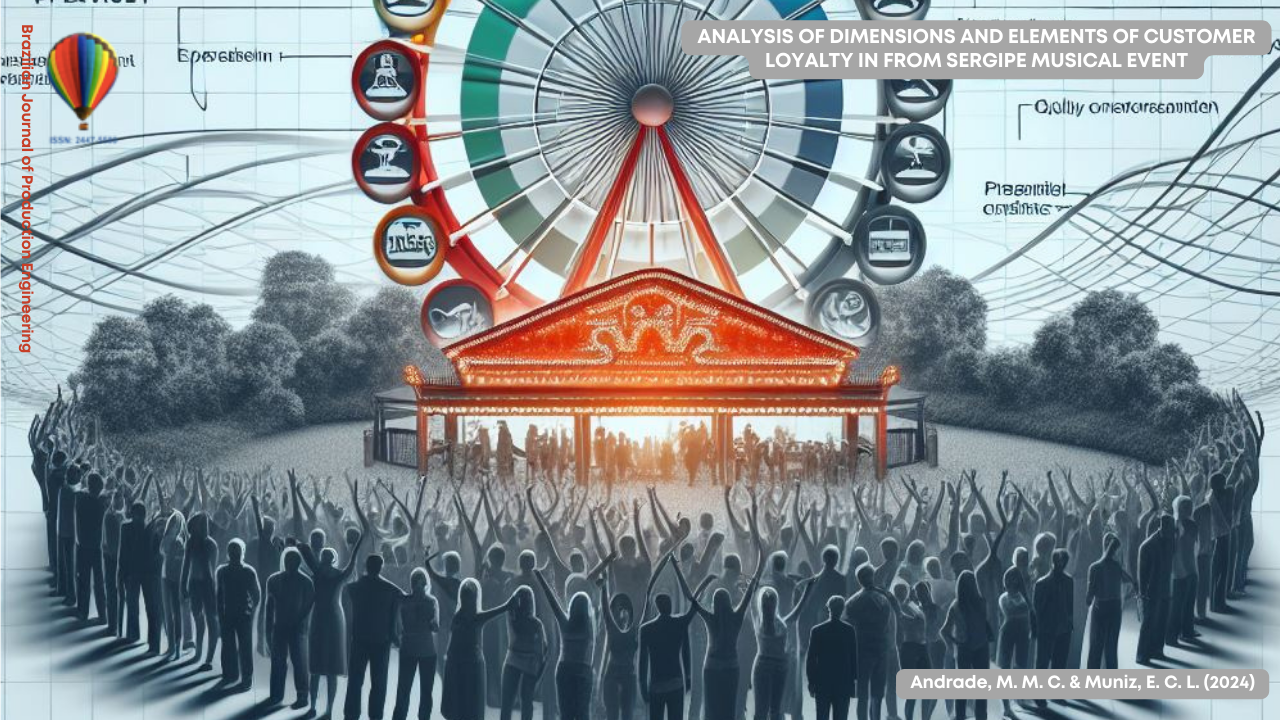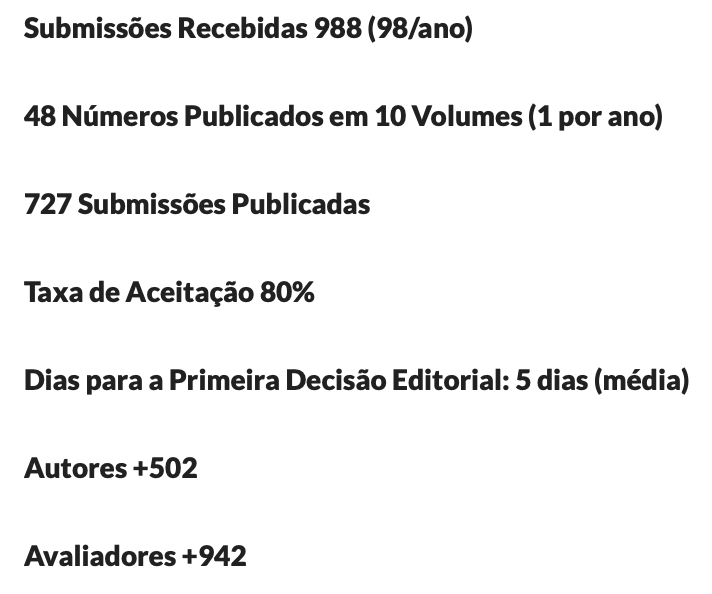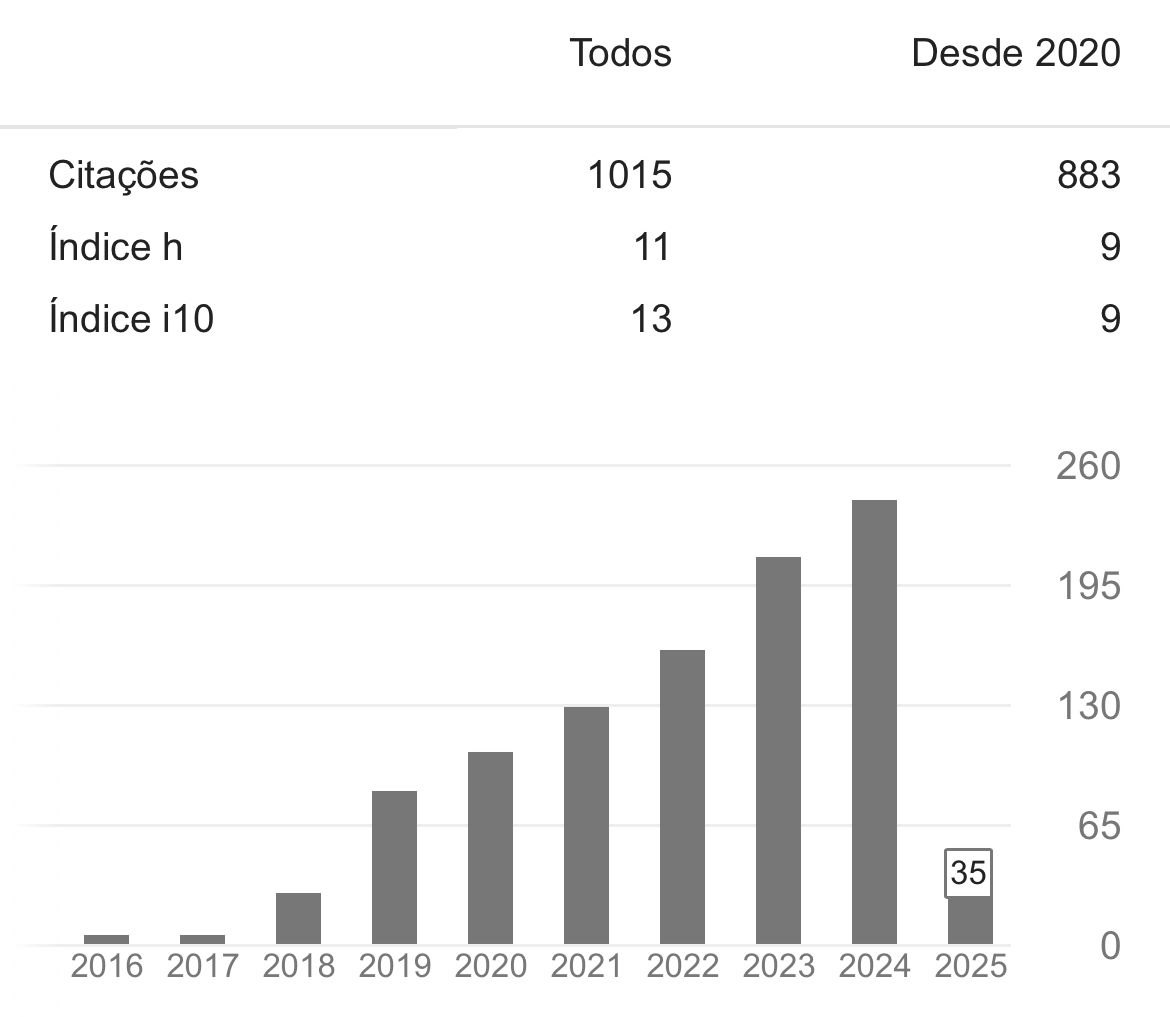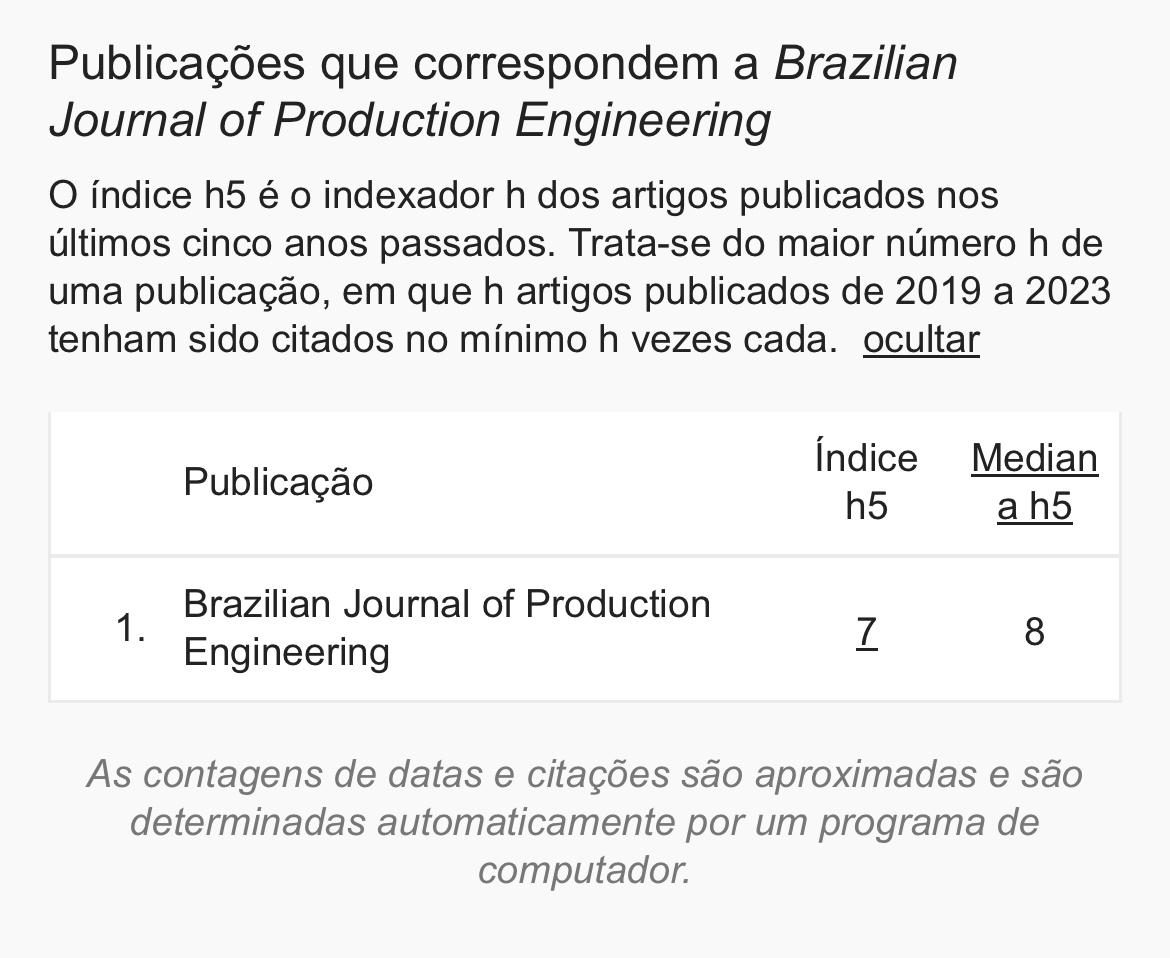Analysis of dimensions and elements of customer loyalty in from Sergipe musical event
DOI:
https://doi.org/10.47456/bjpe.v10i2.44366Keywords:
Customer loyalty, Loyalty elements, Loyalty dimensions, Musical Event, Entertainment EngineeringAbstract
Leisure is part of the population's daily life and entertainment options grow every day, including musical events that have a growing share in the economy. Therefore, this work investigates which elements most influence customer loyalty at musical events. To this end, it identifies, via an integrative systematic review of the literature, 03 main dimensions of loyalty, namely Connection, Satisfaction and Experience and 12 elements belonging to them. They were verified by a survey among customers of a musical event, obtaining 101 valid responses for analysis and verification of theory versus reality. From the results it was found that the Satisfaction dimension has the greatest influence on the sample, highlighting elements such as the quality of cleaning, hygiene and food services, pricing policy practiced, diversification of attractions, among others. While the Connection dimension had less influence. Furthermore, the elements were analyzed by customer profile, bringing a concatenation of opportunities and insights that contribute to improving the experience offered by the event and boosting public loyalty. Finally, this research fills a research gap in Entertainment Engineering, a field that is still little explored on the national scene and with few empirical studies
Downloads
References
Associação Brasileira dos Promotores de Eventos. (2023). Números do Setor. Recuperado de https://abrape.com.br/numeros-do-setor/
Aguiar- Quintana, T. (2015). Under-researched Areas of Event Management in the Past 15 Years. Journal of Tourism & Hospitality, 4(3). https://doi.org/10.4172/2167-0269.1000160 DOI: https://doi.org/10.4172/2167-0269.1000160
Alén-González, E., Rodríguez-Campo, L., Fraiz-Brea, J. A., & Louredo-Lorenzo, M. (2023). Multidimensional analysis of predictors of behavioral intentions in music festivals using environmental psychology. Event Management, 27(3), 367–388. https://doi.org/10.3727/152599522x16419948695215 DOI: https://doi.org/10.3727/152599522X16419948695215
Altschwager, T., Conduit, J., Karpen, I. O., & Goodman, S. (2022). Event engagement: Using event experiences to build brands. Australasian Marketing Journal (AMJ). https://doi.org/10.1177/14413582221127317 DOI: https://doi.org/10.1177/14413582221127317
Barros, C. F., & Cosenza, C. A. N. (2007). Usando Lógica Fuzzy em mega-eventos de esportes: um sistema de avaliação de impactos. Anais do Encontro Nacional de Engenharia de Produção, Foz do Iguaçu, PR, Brasil.
Bezerra da Silva, M. (2013). Engenharia do Entretenimento e Produção Cultural: Uma análise sobre as técnicas e ferramentas em gestão de projetos (Monografia). Universidade do Estado do Rio de Janeiro, Rio de Janeiro, RJ, Brasil.
Bladen, C., Kennel, J., Abson, E., & WILDE, N. (2012). Events Management: An Introduction. 3a ed. Oxon, UK: Routledge. DOI: https://doi.org/10.4324/9780203852972
Cardoso, V. C., & Rennó, S. A. (2019). Iluminação e segurança pública: uma investigação sobre a relação entre design e criminalidade urbana pela perspectiva feminina. Estudos em Design, 27(3), 130-146. https://doi.org/10.35522/eed.v27i3.777 DOI: https://doi.org/10.35522/eed.v27i3.777
Chaney, D., & Martin, D. (2017). The role of shared values in understanding loyalty over time: A longitudinal study on music festivals. Journal of travel research, 56(4), 507–520. https://doi.org/10.1177/0047287516643411 DOI: https://doi.org/10.1177/0047287516643411
Chaves, A. J. (2012). Comunicação e música. São Paulo: Clube de Autores.
Collin-lachaud, I., & Kjeldgaard, D. (2013). Loyalty in a cultural perspective: Insights from french music festivals. Em Research in Consumer Behavior (p. 285–295). Emerald Group Publishing Limited. DOI: https://doi.org/10.1108/S0885-2111(2013)0000015019
Comeau, P., Paquin, M., & Lemay-perreault, R. (2021). Music 4 Cancer: Appreciation of an underground music festival and its philanthropic purpose among festival goers. Loisir et Société / Society and Leisure, 44(3), 345–359. https://doi.org/10.1080/07053436.2021.1999085 DOI: https://doi.org/10.1080/07053436.2021.1999085
Duarte, P., Folgado-Fernández, J. A., & Hernández-Mogollón, J. M. (2018). Measurement of the impact of music festivals on destination image: The case of a womad festival. Event management, 22(4), 517–526. https://doi.org/10.3727/152599518X15264726192451 DOI: https://doi.org/10.3727/152599518X15264726192451
Ensor, J., Robertson, M., Ali-Knight, J. (2007). The dynamics of successful events – the experts’ perspective. Managing leisure, 12(2-3), 223–235. https://doi.org/10.1080/13606710701406550 DOI: https://doi.org/10.1080/13606710701406550
Friques, M. S., & Oliveira, M. X. de. (2012). Oikonomia das Economias: cultura, entretenimento, criatividade e engenharia de produção (Monografia). Escola Politécnica da Universidade Federal do Rio de Janeiro, Rio de Janeiro, RJ, Brasil.
García-de-Soto-Camacho, E., Garcia-gordillo M. A., & Vaca-acosta, R. M. (2023). Dimensions That Influence the Creation of Brand Value of a Music Event and Its Influence on Attendee Satisfaction. Social Sciences, 12(3). https://doi.org/10.3390/socsci12030177 DOI: https://doi.org/10.3390/socsci12030177
Ho, J. M., Tiew, F., & Adamu, A. A. (2022). The determinants of festival participants’ event loyalty: a focus on millennial participants. International journal of event and festival management, 13(4), 422–439. https://doi.org/10.1108/IJEFM-01-2022-0006 DOI: https://doi.org/10.1108/IJEFM-01-2022-0006
Houaiss, A. (2009). Dicionário eletrônico Houaiss da língua portuguesa. 1a ed.
Jasin, M., Firmansyah, A., Anisah, H. U., Junaedi, I. W. R., & Haris, I. (2023). The effects of customer satisfaction, perceived service quality, perceived value, and brand image on customer loyalty. Uncertain Supply Chain Management , 11(2), 763–768. https://doi.org/10.5267/j.uscm.2023.1.004 DOI: https://doi.org/10.5267/j.uscm.2023.1.004
Kamel, J. (2003). Cadeia de Engenharia do Entretenimento [Programa de Engenharia de Produção]. Universidade Federal do Rio de Janeiro, Rio de Janeiro, RJ, Brasil.
Kamel, J., & Souza, F. (2012). Entretenimento Social Clube, Engenharia de Produção e a Economia de Experiência. Sistemas & Gestão, 7(2), 288–297. https://doi.org/10.7177/sg.2012.v7.n2.a11 DOI: https://doi.org/10.7177/sg.2012.v7.n2.a11
Kazar, K. (2020). Brand communities and self-concept congruency in the case of a music festival. Tourism and hospitality research, 20(2), 157–169. https://doi.org/10.1177/1467358419833735 DOI: https://doi.org/10.1177/1467358419833735
Kim, J. H., Lee, K.T., Seok, B.-I., Choi, H.-J., & Jung, S.-H. (2018). Competitive factors of electronic dance music festivals with Social Networking Service (SNS) citizenship behaviour of international tourists. Journal of psychology in Africa (south of the Sahara, the Caribbean, and Afro-Latin America), 28(2), 116–121. https://doi.org/10.1080/14330237.2018.1453987 DOI: https://doi.org/10.1080/14330237.2018.1453987
Kotler, P. & Keller, K. (2006). Marketing Manegement, 12a ed. Livraria Almedina.
Li, C., & He, P. (2022) The dimensional structure of tourism festival and special event innovation and their impacts on tourists’ behavioral intentions. Discrete dynamics in nature and society, 2022, 1–13. https://doi.org/10.1155/2022/1154295 DOI: https://doi.org/10.1155/2022/1154295
Monte, C. (2007). Engenharia do Entretenimento & Carnaval. Engenharia do Entretenimento II: Rio o ano todo, Rio de Janeiro, RJ, Brasil.
Muniz, E. C. L., Dandolini, G. A., Biz, A. A., & Ribeiro, A. C. (2021). Customer knowledge management and smart tourism destinations: a framework for the smart management of the tourist experience – SMARTUR. Journal of Knowledge Management, 25(5), 1336–1361. https://doi.org/10.1108/jkm-07-2020-0529 DOI: https://doi.org/10.1108/JKM-07-2020-0529
Nakane, A. M. (2020). Eventos de Entretenimento Ao Vivo & Marcas: Uma Aliança De Repertórios Comunicacionais De Impacto E Consolidação De Imagens (Tese). Universidade Metodista de São Paulo, São Bernardo do Campo, SP, Brasil.
Oliveira, F. F. de, & Santos, S. M. R. (2014). A arte de fidelizar clientes como diferencial competitivo. Revista Foco, 7(1). https://doi.org/10.21902/jbslawrev. foco.v7i1.123
Oliveira, M. de. (2011) Introdução a eventos. Recuperado de https://www.passeidireto.com/arquivo/37356824/organizacao-de-eventos-zelia-freiberger
Oliveira, K. V. R. de. (2014) Planejamento e Organização de Eventos. 1a ed. Brasília: NT Editora.
Pastre, G. (2020) A experiência do cliente webroomer na jornada de compra no varejo multicanal (Mestrado). Faculdade de Administração, Universidade Federal de Santa Catarina. Florianópolis, SC, Brasil.
Toledo, J. C. (2014). Qualidade: gestão e métodos. Rio de Janeiro: LTC.
Silva, S., & Saraiva, M. (2012). A Gestão da Qualidade como diferencial competitivo na Satisfação e Fidelização de clientes. III Encontro de Tróia - Qualidade, Investigação e Desenvolvimento.
Silva, M. A. R. (2016). Construindo relacionamentos com a marca: qual é o papel da experiência de marca, da individualidade do consumidor e da categoria de produto nesse processo (Doutorado). Faculdade de Economia, Administração e Contabilidade de Ribeirão Preto, Universidade de São Paulo, Ribeirão Preto, SP, Brasil.
Sharma, R., & Joshi, R. (2024). The effect of bank reputation on loyalty – the moderating role of bank type. South Asian Journal of Business Studies, 13(1), 37-55. https://doi.org/10.1108/sajbs-09-2020-0331 DOI: https://doi.org/10.1108/SAJBS-09-2020-0331
Venkatakrishnan, J., Alagiriswamy, R., & Parayitam, S. (2023). Web design and trust as moderators in the relationship between e-service quality, customer satisfaction and customer loyalty. The TQM journal. https://doi.org/10.1108/tqm-10-2022-0298 DOI: https://doi.org/10.1108/TQM-10-2022-0298
Widodo, T., & Jauhari, R. (2023). The Influence of The Service Quality Dimension on Attitudinal Loyalty and Behavioral Loyalty Moderated by The Level of Internet Usage and Switching Costs: Study Case on Indihome in Indonesia. Jurnal Ekonomi, Bisnis & Entrepreneurship, 17(1), 68–85. https://doi.org/10.47750/QAS/25.198.44 DOI: https://doi.org/10.55208/jebe.v17i1.327

Downloads
Published
How to Cite
Issue
Section
License
Copyright (c) 2024 Brazilian Journal of Production Engineering

This work is licensed under a Creative Commons Attribution-NonCommercial-ShareAlike 4.0 International License.

















































































